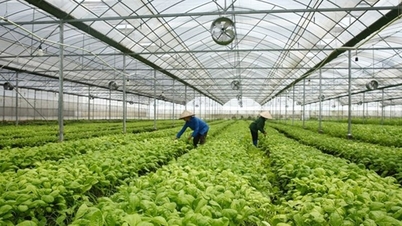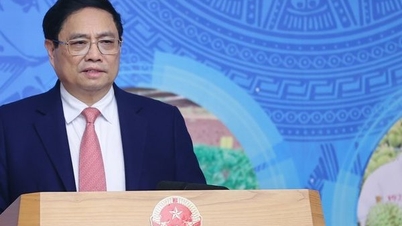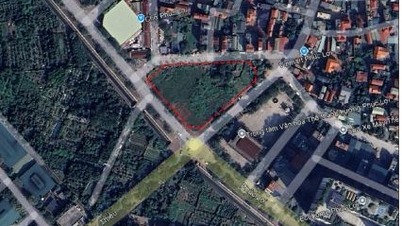On the morning of February 2, Prime Minister Pham Minh Chinh chaired the 2024 Cooperative and Economic Forum with the theme: "Improving the State's support policies according to Resolution No. 20-NQ/TW dated June 16, 2022 - Driving force to promote the development of collective and cooperative economies in the new period".
At Nghe An province, comrade Nguyen Van De - Member of the Provincial Party Executive Committee, Vice Chairman of the Provincial People's Committee chaired. Attending were leaders of departments, branches, unions, cooperative economic organizations, and cooperative enterprises.

COLLECTIVE ECONOMIC SECTOR BASICLY OVERCOMES WEAK SITUATION
Over the past years, the Party, the State, the Government, all levels, sectors and localities have always paid attention to and issued and implemented many policies, mechanisms and strategies to develop the collective economy and cooperatives. Up to now, the collective economic sector has basically overcome the prolonged weakness. Cooperatives have basically completed the transition to a new model.
The number of newly established cooperatives and cooperative unions has increased significantly, with more diverse development in terms of industry, scale and level. In 2023, the country will have about 31,700 cooperatives, 158 cooperative unions and 73,000 cooperative groups. Compared to 2022, the number of cooperatives will increase by about 2,200, the number of cooperatives will increase by 23 and the number of cooperative groups will increase by about 2,000.
The average revenue of cooperatives is 3,592 billion VND/cooperative/year. The average profit of a cooperative in 2022 is 366 million VND/cooperative/year; the average income of a regular worker in a cooperative in 2022 is 56 million VND/person; the collective economic sector contributes nearly 4% of GDP.

However, the collective economic sector of our country has not yet developed as targeted and required. The growth rate and contribution rate of the collective economic sector to GDP are still low. Some members participating in cooperative activities are still formalistic, not fully exercising their rights and obligations.
Cooperatives are not very effective, their organizational models are loose and inappropriate; and their management staff is limited. Most cooperatives and cooperative groups are small in scale, have a narrow scope of operation, and are not very competitive. Joint ventures and associations between cooperatives and between cooperatives and other economic organizations are not popular.
Over the past 20 years, the general legal corridor and mechanisms and policies to support the collective economy have been built and perfected to suit each stage of development.

However, many support policies for specific sectors, activities and services of cooperatives have not been implemented to the right target and have not been effective according to the right objectives. Funding for implementation has not been allocated in a timely manner and must be integrated into other programs and projects.
At the forum, delegates exchanged, discussed and analyzed the development status of the collective economic sector and cooperatives; proposed breakthrough solutions to remove difficulties and obstacles; and contributed ideas and proposed support policies for the collective economic sector and cooperatives.
BE PROACTIVE AND MAKE EFFORTS TO ESCAPE BARRIERS AND ENCOUNTERS
Concluding the forum, Prime Minister Pham Minh Chinh emphasized that the collective economic sector is one of the four important economic sectors in Vietnam's socialist-oriented market economy. Developing the collective economy is an inevitable trend in the context of international integration, in line with Vietnam's socialist-oriented market economy.

In recent times, the collective economic sector and cooperatives have developed more diversely in terms of occupations, scale and quality, providing better support to members, creating jobs and increasing regular income for workers, contributing to the construction of new rural areas, ensuring social security, order and safety, gradually affirming its important position and role in the national economy.
Pointing out the shortcomings and limitations in the collective economic sector, the Prime Minister said that the growth rate is still slow; production and business capacity is weak and fragmented; the level of cooperative management staff is not high; although there are many incentive and support policies, they are spread out, scattered, lacking resources, and even unfeasible...

The main reasons are that leadership and direction are still slow, not bold and decisive; lack of attention in organizing implementation and allocating resources; still having a collective mentality, not keeping up with market trends...
In the coming time, based on the analysis of the context and general situation, Prime Minister Pham Minh Chinh suggested that the collective economic sector must be proactive, strive to overcome barriers and obstacles, and rise up; strongly shift both thinking and action towards the trend of green economy, circular economy, knowledge economy, and sharing economy; develop both quantity and quality; focus on increasing capital, labor productivity, and production efficiency.

Developing and improving the operational efficiency of the collective economy is the task of the entire political system... is an important and regular political task. Therefore, it is necessary to closely follow the Party's guidelines and policies, the State's laws and policies to develop the collective economy; renew thinking, have a long-term vision, organize implementation more comprehensively and generally; strive to catch up, progress together, and rise up with other economic sectors...
At the forum, Prime Minister Pham Minh Chinh assigned specific tasks to ministries, branches and localities; at the same time encouraged and believed that the collective economic sector and cooperatives would have strong changes, develop sustainably and complete the goals of Resolution No. 20-NQ/TW.
Source






![[Photo] General Secretary To Lam and National Assembly Chairman Tran Thanh Man attend the 80th Anniversary of the Traditional Day of the Vietnamese Inspection Sector](https://vphoto.vietnam.vn/thumb/1200x675/vietnam/resource/IMAGE/2025/11/17/1763356362984_a2-bnd-7940-3561-jpg.webp)







































































































Comment (0)